Jean-Luc Godard
-
“Be Beautiful and Shut Up”: Anna Karina on Filmmaking with Jean-Luc Godard

Anna Karina is, along with Gena Rowlands, my favorite actress of all time. The seven and a half films that she made with Jean-Luc Godard constitute, arguably, the most influential body of work in the history of cinema. They certainly were more important in my own development as a filmmaker than any of the other countless masterpieces I fell in love with in the course of my cinematic education. Those seven and a half films redefined and redrew the map of what cinema is and could be more radically than anything I had seen before or since. Godard’s relationship with […]
by Caveh Zahedi on May 9, 2016 -
A Conversation with Philippe Garrel (Part 1)
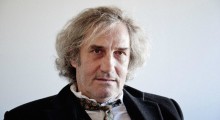
Explaining why Philippe Garrel is one of my favorite working directors can be difficult. Talking with a co-worker, I tried to sketch out his recurring interests: “he makes movies about men, often directors, who cheat on women and have trouble with themselves.” She rolled her eyes, and I’m not blaming her: what, again? Garrel began making movies as a teenager, and his early work that I’ve seen is both gorgeous and the epitome of stereotypical arthouse pretension of the period. There is 1968’s Le lit de la vierge, a very of-its-time film about a particularly mopey Jesus, and 1975’s Le berceau […]
by Vadim Rizov on Jan 13, 2016 -
“I Don’t Want to Make Audiovisual Historical Aids”: Kent Jones on Hitchcock/Truffaut
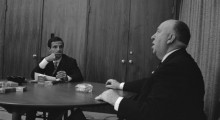
The formal title of Hitchcock/Truffaut (alternately Hitchcock and The Cinema According to Alfred Hitchcock) is a vexed question mooted by its famous title design: Hitchcock’s name on one side, François Truffaut’s on the other. First published in 1966 and revised before Truffaut’s death, it’s one of the most commonly name-checked starter texts for anyone looking to learn more about film. In a series of extensive, probing and relatively unguarded conversations, Truffaut guides Hitchcock through his work film-by-film. Illustrated by numerous stills (including one- and two-page layouts showing every shot choice from particularly famous/intense sequences, breaking them down in a lucid, teachable way), the book allows a director in total command […]
by Vadim Rizov on Dec 4, 2015 -
Watch: Breathless and How World War II Changed Film History
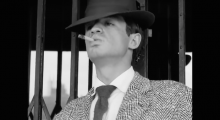
This is a solid nine-minute look at Breathless and how it grapples with Hollywood’s influence on the film industry. Beginning with Quentin Tarantino’s oft-noted quote that he “outgrew” Godard after being initially inspired to make movies by him, this video from The Nerdwriter breaks down how WWII led to an influx of Hollywood films in France, the way Breathless grapples with this legacy, the specter of Humphrey Bogart, Lacan’s mirror stage and much more. Hat-tip to David Hudson at Keyframe Daily.
by Filmmaker Staff on Nov 9, 2015 -
Goodbye to 3-D Rules
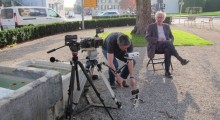
To a degree, the content of Jean-Luc Godard’s Goodbye to Language will be familiar to viewers who have kept up with the director’s latter-day work: aphorisms and quotations by the score, obdurately unidentified characters whose relationship to each other is unclear, snatches of disparate music cued and cut off with disorienting abruptness. It’s not for everyone, but Godard’s first three-dimensional film is so visually astonishing that a lack of comprehension isn’t a barrier. Outdoors, sea and land stretch out into a receding horizon deeper than anything you’ve seen. Inside, there are more knockout distortions transforming even the most banal objects: […]
by Vadim Rizov on Oct 20, 2014 -
NYFF ’14: The Wonders, ’71, Goodbye to Language
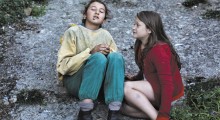
Now entering its 52nd year, the New York Film Festival tends to benefit and suffer from its fixed position as last stop on the fall festival circuit. The obvious pro would be that the discerning selection committee, headed up by Kent Jones, is allowed to cherry pick whatever they deem to be the best of the year; the con, at least for those keeping up with film criticism, is that the majority of these titles arrive pre-packaged with their own neat and tidy media narratives. (A year later, I’m still overhearing men debating the virtues of Blue Is The Warmest Color’s sex scenes.) As such, it’s nearly […]
by Sarah Salovaara on Sep 26, 2014 -
Watch: 45 Minutes of Jean-Luc Godard on Goodbye to Language

Canon Europe recently conducted a 45 minute interview with Jean-Luc Godard on Goodbye to Language and the resulting conversation is pretty incredible. One could parse through the exchange for hours, but it’s best to watch for yourself and hear Godard on the everything from the melancholic underpinnings of “SMS,” the boundary-less nature of 3D, the fickle ways of language (“montage” vs. “editing”) and exploiting spatial imbalances (the creation of reverse shots). The interview also features a few short clips from Goodbye to Language and the following comment on its title: “When I say ‘farewell’ to language, it really means ‘farewell,’ meaning to say goodbye to […]
by Sarah Salovaara on Jun 13, 2014 -
Legendary Producer Marin Karmitz on Great Directors, Producing, and Why Money is Never the Real Problem
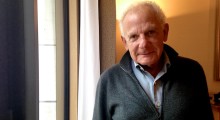
Combining taste, business savvy, and enduring idealism for the role cinema can play within the broader culture, legendary producer, distributor, director and exhibitor Marin Karmitz has helped shape the course of world cinema since launching his MK2 Films in the early 1970s. Beginning his career as an assistant director to, among others, Jean-Luc Godard and Agnes Varda, Karmitz went on to become one of the most distinguished producers of his generation, with such classics as Kieslowski’s Three Colors trilogy, Jean-Luc Godard’s Every Man for Himself and Claude Chabrol’s Ceremonie to his name. But his list of producing credits only tells […]
by Scott Macaulay on Jun 5, 2014 -
Godard Excuses Himself from Cannes with “Letter in Motion to Gilles Jacob and Thierry Fremaux
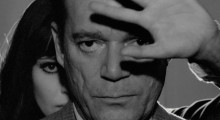
More than half a century since Breathless, Godard still enjoys his fair share of devotees despite a descent into overwrought provocations. Rather than field befuddled questions following the premiere of his 3-D talking dog opus Goodbye to Language after its Cannes premiere this morning, the filmmaker recused himself from promotion with the above. Opening with the official seal of “Khan Khanne,” the “Letter in Motion to Gilles Jacob and Thierry Fremaux,” fashions clips from Godard’s own work, asides from Hannah Arendt, and ruminations on these “other worlds” he now inhabits. I began trying to draw out what little French I understand before noticing that Indiewire had translated the […]
by Sarah Salovaara on May 21, 2014 -
MARK KERMODE’S FILM CLUB KICKS OFF WITH JIM MCBRIDE’S “BREATHLESS”
As a teenager in the U.K., I grew up reading the reviews of film critic Mark Kermode, whose smart and opinionated engagement with contemporary cinema rapidly won him a following and led to him becoming a familiar presence on TV and radio arts programs. Kermode is now one of the most passionate and prominent voices in (populist) film criticism — his slot on Simon Mayo’s BBC Five Live radio show has been a very successful podcast on iTunes for some years — and he has used his position as a figure of influence to champion films and directors that his […]
by Nick Dawson on May 22, 2012
